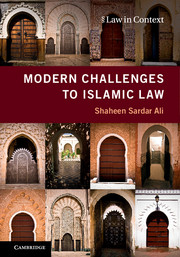Book contents
- Frontmatter
- Dedication
- Contents
- Acknowledgements
- Glossary
- Table of Cases
- Table of Legislation
- Introduction
- 1 Sharia: The Flowing Stream
- 2 An Elephant in the Room or a Needle in a Haystack? Searching for ‘Islamic’ Constitutionalism(s)
- 3 Contextualizing Family Law Reform and Plural Legalities in Post-colonial Pakistan
- 4 In Search of Legitimacy: The Dilemma of Islamic Finance
- 5 Muslim Women's Contributions to Drafting CEDAW: An Untold Narrative
- 6 CEDAW? What's That? ‘Domesticating’ ‘International’ Women's Human Rights in Muslim Jurisdictions: Reflections on Pakistan's Engagement with CEDAW
- 7 ‘Between the Devil and the Deep Blue Sea’: Sharia Councils and Muslim Women's Rights in the British Muslim Diaspora
- 8 Internet Fatawa: Challenging Tradition and Modernity in Women and Gender Issues
- Conclusion
- Bibliography
- Index
7 - ‘Between the Devil and the Deep Blue Sea’: Sharia Councils and Muslim Women's Rights in the British Muslim Diaspora
Published online by Cambridge University Press: 05 September 2016
- Frontmatter
- Dedication
- Contents
- Acknowledgements
- Glossary
- Table of Cases
- Table of Legislation
- Introduction
- 1 Sharia: The Flowing Stream
- 2 An Elephant in the Room or a Needle in a Haystack? Searching for ‘Islamic’ Constitutionalism(s)
- 3 Contextualizing Family Law Reform and Plural Legalities in Post-colonial Pakistan
- 4 In Search of Legitimacy: The Dilemma of Islamic Finance
- 5 Muslim Women's Contributions to Drafting CEDAW: An Untold Narrative
- 6 CEDAW? What's That? ‘Domesticating’ ‘International’ Women's Human Rights in Muslim Jurisdictions: Reflections on Pakistan's Engagement with CEDAW
- 7 ‘Between the Devil and the Deep Blue Sea’: Sharia Councils and Muslim Women's Rights in the British Muslim Diaspora
- 8 Internet Fatawa: Challenging Tradition and Modernity in Women and Gender Issues
- Conclusion
- Bibliography
- Index
Summary
Introduction
A significant articulation of plurality and evolution within the Islamic legal traditions and conceptions of sharia came about with large numbers of Muslims migrating to non-Muslim-majority jurisdictions and putting down roots there. In the United Kingdom, for instance, the application of Islamic law and sharia is continuously undergoing a transformative process, emerging and evolving as what has been called Angrezi (‘English’ in Urdu) sharia – a hybrid of Islamic law and UK law. In common with Muslim-majority jurisdictions, the focus of Islamic law lies in the sphere of family law, this being central to group identity and cultural preservation through control of members of the group, especially women. An example of such control comes in the form of dispute resolution, focusing on family matters, in Sharia Councils.
The fact that British Muslim communities’ interest in Islamic law and sharia lies foremost in being able to control the outcome of marriage and divorce disputes resonates with how the wider British public and state institutions perceive Islamic law. In 2008, the then Archbishop of Canterbury, Dr Rowan Williams, famously declared that Muslim communities sought the freedom to live under sharia law, and that there needs to be ‘access to recognised authority acting for a religious group: there is already, of course, an Islamic Shari'a Council, much in demand for rulings on marital questions in the UK’. He then qualified this by cautioning that ‘recognition of “supplementary jurisdiction” in some areas, especially family law, could have the effect of reinforcing in minority communities some of the most repressive or retrograde elements in them, with particularly serious consequences for the role and liberties of women’.
Lord Bach, speaking in the House of Lords a year after Dr Williams's speech, was of the view that we
cannot prevent individuals seeking to regulate their lives through religious beliefs or cultural tradition. Communities and other groups have the option to use religious councils or any other system of alternative dispute resolution and agree to abide by their decisions. Nothing in the law of England and Wales prevents people abiding by Sharia principles if they wish, provided that their actions do not conflict with the law in England and Wales. If they do, the law in England and Wales prevails.
- Type
- Chapter
- Information
- Modern Challenges to Islamic Law , pp. 206 - 232Publisher: Cambridge University PressPrint publication year: 2016



